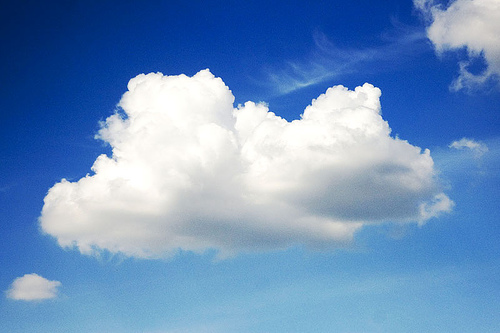The Cloud, Explained
It’s the cloud. THE CLOUD! Very few times has something so soft and fluffy has created fear and doubt in the minds of many. Yet we hear about it all the time. So what is “the cloud?” Why should I care about it? Is it safe?
The cloud can be as simply put as another name for the internet. More specifically, the cloud is a bunch of servers that hold data. They are typically warehoused in different locations around the world. No ones owns the cloud, it’s just the name of the collection of data centers on the internet. One of the largest and closest to us is Google’s Datacenter in The Dalles, Oregon. The cloud stores information that you can access and save to. In fact, you probably know more than you think about the cloud.

The cloud, or at least what most think about when they hear the name.
Have you used services such as Netflix, Youtube, Gmail, Hotmail, Microsoft OneDrive, Dropbox, Carbonite, Office 365, or Google Docs? Then you’ve accessed and used the cloud! The data is stored on a server and you are either downloading or uploading that data to and from the servers. Instead of the data being stored on your computer or somewhere that you can actually touch (and control, but we’ll get to that in a moment), it is instead somewhere else. Most of the time, you don’t know where, but it’s out there.
The biggest advantage is that saving your data in the cloud ensures that your data won’t be lost with your computer or device in case of catastrophe. In Carbonite’s case, it backs up your data constantly to their servers. If your computer is lost or stolen, you can still retrieve that data from another computer. It’s also called an off-site backup, meaning if a natural disaster or something else occurs that would destroy your local backup drives, your data is safe in a different region of the country or world.
So why the fear of the cloud if it seems like it’s actually a good thing? As many of you have picked up, I’m leaving a lot of ambiguity when it comes to where you data is exactly stored. Most of the time, you just simply don’t know. It could be as close as 100 miles away, or it could be over an ocean away. It’s this loss of control that turns people off from wanting to use the cloud. Sure, there are the video services like Netflix and Youtube where you probably don’t care about that data nor where it’s stored. But stuff like email and data storage could be very sensitive with the information and you’re trusting that company to keep your data safe. I’ll just put it this way: don’t store illegal content in the cloud unless you like your fate in someone else’s hands!
It’s always a good idea to do your research before trusting a company with your data. Have they been hacked recently? Apple’s iCloud sure has been! If your data is extremely sensitive, such as proprietary company data, it may be best to set up a secure local storage, with an option of off-site data backups within your own company. Kind of like creating your own “cloud” backup service. Give us a call if you’d like more information about this setup.
Calling off-site data storage “the cloud” is, in my opinion, one of the worst names it could have been given. It was meant to basically mean that the data was going out to the mysterious concept of the internet, but instead eludes to things that everyone can see on a normal day in Oregon if they look up at the sky: clouds. While it’s not as easy as that, knowing what the cloud actually means, along with the positives and potential negatives can help you make an informed decision if it’s right for you or your business.

Data center which is where a lot of cloud storage is located.



